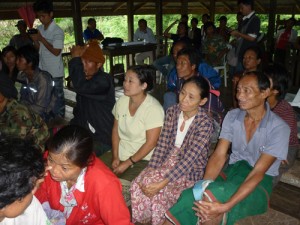The Italian-Thai Development Company has made a second compensation payment to Karen villagers affected by the Dawei-Kanchanaburi road construction in eastern Tavoy Town.
 On June 8, the Italian-Thai Development Company and its partner, Max Myanmar, paid 15,582,240 Thai baht (4,93,750.47 US$)compensation to 20 villagers affected by the road between Myitta and Kaw Htee Lor (Thebyu Chaung). The villagers’ plantations were destroyed by the construction of an access road and by 80 metre road alignment.
On June 8, the Italian-Thai Development Company and its partner, Max Myanmar, paid 15,582,240 Thai baht (4,93,750.47 US$)compensation to 20 villagers affected by the road between Myitta and Kaw Htee Lor (Thebyu Chaung). The villagers’ plantations were destroyed by the construction of an access road and by 80 metre road alignment.
The compensation was paid after villagers mounted a strong protest campaign demanding compensation from the company for the loss of their plantations.
Naw Ma Nyunt, one of the affected villagers told Karen News.
“I am satisfied with the compensation price paid for the loss of my fruit tress. But for my land, the compensation price is low for me.”
The company compensation rate varied for the land and for the different types of trees affected – one betel nut tree in fruit was priced at 120,000kyat (141.76 US$)and 500,000kyat (590.67 US$) was paid for an acre of vacant land.
Naw Paw Win, a villager in Kaw Htee Lor affected by the road construction spoke to Karen News.
“I am pleased with the compensation. The money I got for my land and trees I will use to buy more land and start a plantation.”
Saw Ko, a village elder explained to Karen News.
“If compared to other villages, especially those people living in the Nabule Dawei coastal area, the villagers here got a higher compensation. The reason is that the villagers here are united and
worked hard at talks with the company. The local people asked for more, but after negotiations we settled on this agreement. Karen leaders were also a big help to us.”
Saw Ko pointed out that the ITD company initially offered to pay villagers less and those on the coast who negotiated individual agreements received little.
“If we compare what we got paid to what the Tavoyan villagers got, we did well. The company and the local Burmese authorities negotiated to pay them only 1,000 kyat (1.18 US$) for one betel nut tree with fruit, while our villagers got paid 120,000kyat (141.76 US$)a tree.”


